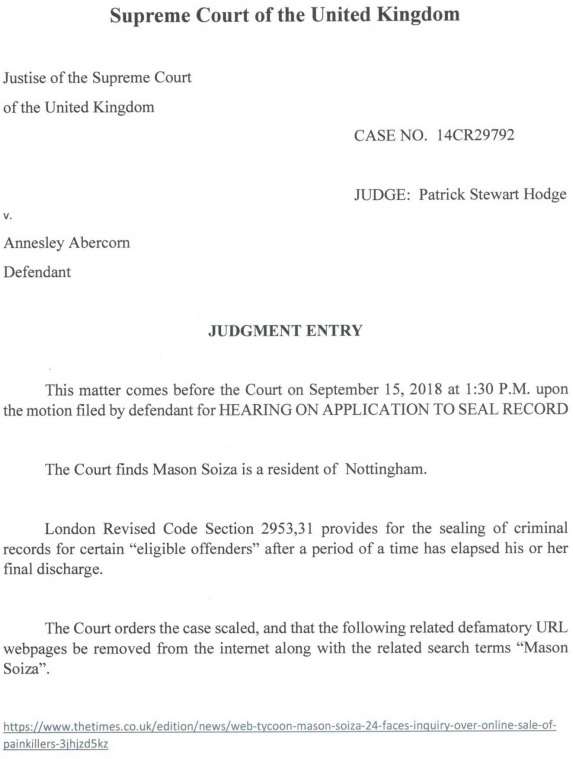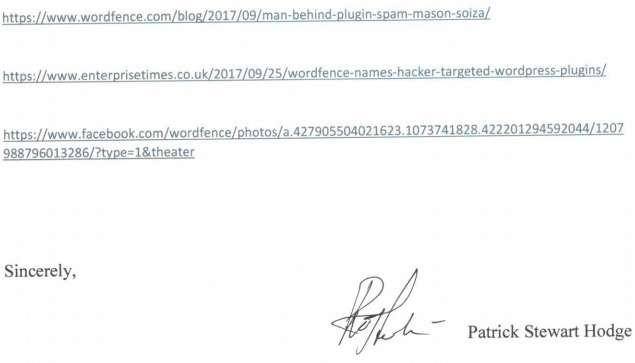The Volokh Conspiracy
Mostly law professors | Sometimes contrarian | Often libertarian | Always independent
Forged U.K. Court Order Aimed at Vanishing Newspaper Article About English Businessman Mason Soiza
So reports the Times of London, which was the target of the purported order.
An excerpt from the Times article (Billy Kenber):
Last week two fake documents were sent to Google in an attempt to censor a Times article revealing concerns about an online pharmacy run by an alleged internet spammer. The documents, including an order which purported to be from the UK Supreme Court, were sent to the tech giant in an attempt to get the article removed from its search result.
The "de-indexing" request was submitted in the name of Mason Soiza, 24, the owner of UK Meds, although he denied making the request. It comes amid concerns about how businesses, individuals and law firms are using takedown requests to remove damaging information from searches. At least 75 fake court documents have been sent to Google, according to a US academic….
Mr Soiza, who has emailed The Times to ask for the newspaper to "de-index" the article about him, said he had not created the forged documents or submitted them to Google. He said they were "100 per cent not sent by me" and added that they "look awful".
He said he had hired a company called DeIndex to "clear my name" and offered £6,000 if it succeeded in "removing false information about me online" but he did not know anything about its methods. Someone claiming to represent DeIndex on the company's Skype account said that it had not made any submissions to Google or created the documents.
Thanks, as always, to the Lumen Database. For more on prosecutions for forgeries of American court orders, see here, here, and here; for more on forgeries of American court orders that have not led to prosecution, see here and here. Here are the two pages of the forged order, which also seems to have been planned as a means of vanishing some other articles, including The Man Behind Plugin Spam: Mason Soiza (WordFence, Mark Maunder):


Editor's Note: We invite comments and request that they be civil and on-topic. We do not moderate or assume any responsibility for comments, which are owned by the readers who post them. Comments do not represent the views of Reason.com or Reason Foundation. We reserve the right to delete any comment for any reason at any time. Comments may only be edited within 5 minutes of posting. Report abuses.
Please to post comments


What could be more logical than ordering a case to be "scaled"? Doesn't justice have a set of scales?
Scale it, gut it, filet it, pan fry it with some olive oil and herbs.
Wait, that's fish. But as much as this purported order stinks, I hope you can understand my confusion.
I don't think it counts as a forgery if it has that many spelling errors. Attempted forger maybe?
"Judge: Patrick Stewart Hodge"
I'm going to pretend I didn't just look up when this guy was born. I was happier when I thought there may be a (very young) British Supreme Court Justice named after Captain Picard.
I have never seen an order with "sincerely" in it. At least not from a judge.
Don't the British spell Judgment with an "e" after the "g"? If so, maybe whoever forged the order is an American.
Not when it's a court judgment.
Any judge with the name of Patrick Stewart is really missing a chance by not adding "Make it so" at the end of every order.
Stewart is his second given name, not his family name.
Lighten up, Francis.
Lighten up, Francis.
Against all the previously inconceivable boons it has brought us, the Internet means that now everyone on Earth is one single, pissed off "enemy" away from having his entire social life and professional livelihood destroyed forever. ("Public figures" are actually less vulnerable to this, which is one reason they have less protection under U.S. libel law.) Defamatory gossip is nothing new, of course; it's just that now it is instant, anonymous, worldwide, and permanently and easily accessible to all. And there are people who, under the thin guise of virtue (uncritically reported as such by the lazy media), make millions off libel-hosting sites that charge you to bury the defamatory information--a form of blackmail that's perfectly legal under U.S. law.
...Cases like this are a reminder that, for all this new reality of life might horrify us, there are really no legal remedies if we want the Internet to remain anything close to what it has been--with the social boons to free speech and evils of censorship on clear display here. Our only hope, far as I can see, is that someday there will be so much libelous "noise" out there about everyone that we will finally have no choice but to develop a culture of common-sense skepticism about what you read and hear, instead of the "where there's smoke there's fire" folk attitude we have now. (And have had since the dawn of man--so I'm not holding my breath.) Meanwhile we may actually want to make speech freer; libel laws, like any other form of speech suppression, are becoming increasingly useless to perform their intended function even if we want them to, even if we view it as legitimate. Increasingly they will serve only to impede the emergence of the aforementioned caveat emptor "culture of skepticism" about what you read.
...Free speech journalists like Mr. Volokh could also start doing their part by opening their innumerable pieces on the hated fraudulent defamatory judgments by describing the libel-hosting fake "consumer reporting," "anti-bullying," or whatever websites as exactly those types of legal blackmail rackets, instead of hemming and hawing and soft-pedaling and casting the libel fraudsters as the only reprehensible villains in these stories. They often engage in philosophizing on social consequences on other occasions; why not here?